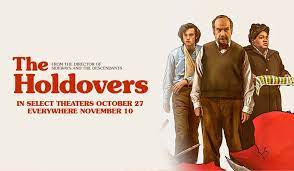
The Holdovers was a little bit Dead Poets Society, a little bit Scent of a Woman, and a whole lot of charming and entertaining. This film was a lot of fun, and it was very much a character-driven film. That is to say that there wasn’t a ton of plot and there was even less action. This was a story about characters who were broken and either didn’t know how to heal or didn’t even know that they needed to heal. Circumstances brought them together and forced them to be together for the Holidays, and they all slowly came to grips with where the pain was coming from in their lives and how they could manage it.
Alexander Payne is very good at this kind of filmmaking, and his films often are populated by broken characters who need to be fixed and The Holdovers is the latest example in that line.
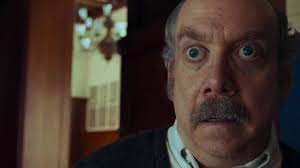
The main character in this story is Paul Hunham (Paul Giamatti), a history teacher at a prestigious New England prep school for boys whose crankiness is matched only by his pretentiousness. He seems to relish in giving the boys grades that will prevent them from getting into the Ivy League school of their parents’ choice and he revels in putting these spoiled and entitled brats in what he thinks is their place. We learn later that this misplaced populism isn’t in him from principle so much as it has been ingrained in him by events from his past that have shaped who he has become, and he has never addressed those issues to this point in his life. The two and a half weeks he spends held over in the school over the Holidays will force him to confront that past and will force him to grow as a person and a human being. The character arc that Paul experiences is both satisfying and heartwarming as he goes from tyrant to prince, and it happens completely organically within the confines of the story.
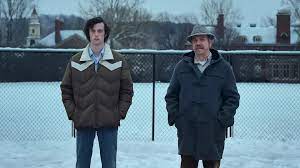
Angus Tully (Dominic Sessa) is the unfortunate student who has to stay over the Holidays with Mr. Hunham. Left behind when his mother and stepfather went to St. Kitts and then were unavailable to give permission for him to go with other kids on a skiing trip, Angus must endure 3 weeks alone with Mr. Hunham, the least favorite teacher of everyone in the school. Angus’s scars are more visible than Hunham’s, but Angus tries to mask them with a tough attitude and a cocky disposition. Angus is another character with a terrific character arc, as he goes from a petulant malcontent to a sensitive kid who seems to have found is place in the world and is comfortable with it.
The chemistry between Giamatti and Sessa was also spectacular as they learned and grew together.
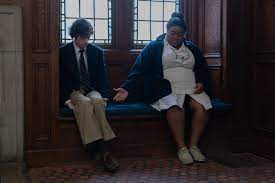
The third character in our triumvirate was Mary Lamb (Da’Vine Joy Randolph) head of the cafeteria and the mother of a former student of the school who was recently killed in Vietnam. She puts on a brave face for most of the film, but she is being torn apart on the inside by the memory of her son and she misses having him in her life. He was able to attend the school because she worked there, but going to an Ivy League school was beyond her means so he joined the army thinking he could go to college on the GI Bill once he got out. Randolph’s performance in this film is beautifully tragic, as she loses just enough control of her emotions just enough times for us to be able to understand the pain she trying to squelch. Her arc is different from Angus’s and Mr. Hunham’s but they’re all connected to each other and she would not have been able to go on her journey without them.
The plot of the story is really secondary to the character’s journeys and it essentially serves as a vehicle to facilitate the journeys the characters experience. The argument could be made that the movie is a bit episodic, except that the various scenes do build off each other and there are a lot of things that are planted early in the screenplay that are paid off later. All of the scenes demonstrate the growth of the characters and they all fit seamlessly together. Most episodic films could have the various scenes interchanged and nothing would change in the overall story. That is not the case with The Holdovers and screenwriter David Hemingson did an outstanding job of meticulously crafting a narrative that didn’t overpower the character growth but demonstrated perfectly how these broken people fixed each other.
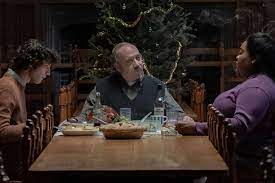
Overall, this is a feel-good film that is very entertaining and should deservedly see its fair share of recognition come Awards Season.